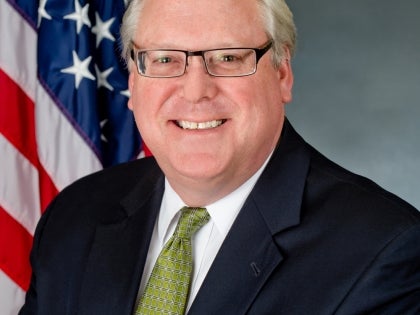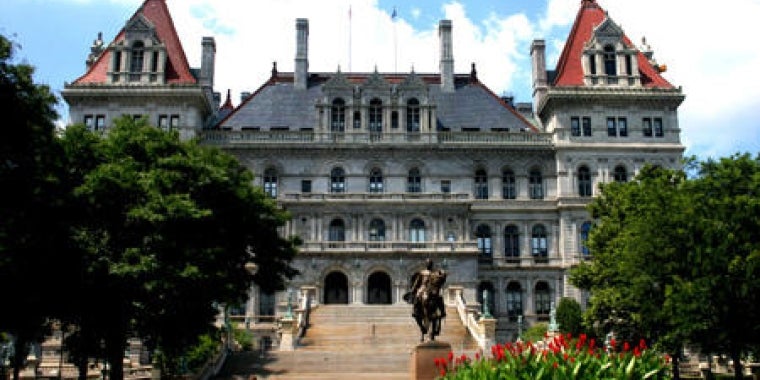
O'Mara on state budget: spending control and future tax breaks, but not enough overall
Thomas F. O'Mara
March 27, 2013
-
ISSUE:
- Budget

Albany, N.Y., March 27—State Senator Tom O’Mara (R-C, Big Flats) today welcomed the ongoing state spending restraint – for the third consecutive year state spending growth will remain below two percent – and the establishment of future tax breaks in the state’s final 2013-14 state budget.
The Senate finished approving the state’s new fiscal plan early this morning, and the Assembly is expected to follow suit and give the budget final legislative approval on Thursday. It will then be signed into law by Governor Andrew Cuomo, representing the third year in a row the state budget's been enacted on time.
But O’Mara stressed that New York’s new, roughly $142-billion fiscal plan still falls short in several key areas, including the failure to include significant mandate relief for local governments.
“Tax breaks have been rare sightings in New York State budgets this decade. So one bright spot is that this budget finally includes a few future tax breaks for businesses, manufacturers and working families. It continues to keep a lid on state spending, and it opens the door to a future focus on tax cutting,” said O’Mara. “But it’s nowhere near the bold action we need to get New York off the bottom of the list of states with the worst business climates in America. We have to keep fighting for property tax relief, mandate relief, small business tax cuts, a manufacturing revival and other actions that stay focused on private-sector job growth.”
Tax breaks established in the 2013-14 state budget include:
-- the continuation of middle-class tax rate reductions first enacted in 2011, which were set to expire in 2014. The lower rates, which will also benefit many small businesses and farmers, are currently at their lowest level in 60 years;
-- a 25-percent cut in the tax rate for manufacturers, phased in over five years, that will reduce the rate from its current 6.5 percent to 4.875 percent by 2018;
-- beginning in 2014, a three-year Family Tax Relief credit;
-- a new Hire-a-Vet tax credit to businesses that hire veterans returning home from military service. The credit will be equal to 10 percent of total wages paid to the employed veteran, and 15 percent of wages paid if the veteran is disabled;
-- allowing volunteer fire departments, ambulance services and other emergency services squads to claim reimbursement for the state petroleum business tax on fuel used in their emergency services vehicles;
-- extending the enhanced tax credit for the rehabilitation of historic properties; and
-- creating a business incubator program including authorizing the establishment of 10 high-tech “innovation hot spots” over the next two years. The new business incubators will be anchored by universities or colleges and provide tax benefits for tenant start-ups. They’re aimed at fostering local economic growth by offering inventors and entrepreneurs a low-cost business environment.
However while O’Mara praised the tax relief initiatives, he said that other actions being taken in this year’s budget, largely at the insistence of the governor and the Legislature’s Democratic leaders, will continue to stand in the way of private-sector job growth throughout the upstate economy. These actions include the failure to fully reject Cuomo's proposal for a five-year extension of a higher utility tax first imposed on New Yorkers in 2009.
O’Mara pointed to the latest report from the Tax Foundation that, for the second year in a row, ranks New York as the state with the worst business climate in the nation. The new report also put New York at or near the top of the rankings in numerous tax categories.
While Senate Republicans successfully fought for the final budget agreement to reject Cuomo’s proposed five-year extension of a higher utility tax first imposed on New Yorkers in 2009 -- the so-called 18-a assessment that hits farmers, manufacturers and senior citizens facing high energy costs especially hard – the higher assessment will be reduced and phased out over three years, beginning next year.
“Higher taxes like this one are tough on consumers and make it harder and harder for New York’s businesses, farmers and manufacturers to stay competitive,” said O’Mara. “Senate Republicans are fighting a lonely battle on this front. We successfully rolled back Governor Cuomo’s original plan for a five-year extension, but we need to keep trying to convince the governor and Assembly leaders that this higher tax was a bad idea four years ago and the worst thing we can do is to make New Yorkers keep paying it. It’s already taken billions of dollars out of the state economy.”
The 2009 tax hike has already taken $1.2 billion out of the economy, O’Mara said, and if the governor’s proposed five-year extension had become law, it would have meant another nearly $3-billion economic hit over the next several years.
O’Mara pointed to the state’s most recent jobless numbers to renew his call for even bolder action on the state’s part. The state Labor Department released jobless figures last week showing that unemployment rates moved past 10 percent in Chemung, Schuyler and Steuben counties over the past year, with the region’s manufacturing sector being hit especially hard. No area of the state had a decline in unemployment between January 2012 and January 2013.
“The most recent unemployment numbers reinforce the fact that we have to do better. We have to keep sending stronger and stronger messages that New York’s serious about economic growth and job creation. This budget takes some important moves in that direction that we can build on going forward, but overall it’s not what we need to do to produce a business climate that invites private-sector job growth, welcomes businesses and industries, and helps provide long-term economic security for workers and their families,” O’Mara said. “So we’ll keep fighting.”
He added that he will continue to call for tax cuts and other actions that he and others believe are central to reviving the upstate economy. In particular, O’Mara is currently sponsoring legislation calling for a two-year phase-out of the corporate franchise tax for manufacturers across the Southern Tier and Finger Lakes regions, and statewide. O’Mara and manufacturing leaders believe that move would help create upwards of 3,000 good-paying, private-sector jobs over the next few years, encourage existing manufacturers to expand and invest in their New York facilities, and make the state a more attractive place for other manufacturers to locate their operations here in the future.
New York’s manufacturers currently pay taxes that are higher than virtually anywhere else in the industrialized world.
Other budget actions O’Mara highlighted include:
-- an approximately $1-billion increase in state aid to local schools, bringing total state education aid to $21.1 billion;
-- a $4-million boost in state aid to local libraries;
-- a $75-million increase in funding for the Consolidated Highway Improvement Program (CHIPS) that significantly raises local funding for the improvement and maintenance of local roads and bridges statewide; and
-- increasing community college base aid by $150 per full-time equivalent (FTE) student, which will benefit community colleges statewide including Corning, Tompkins Cortland and Finger Lakes.



